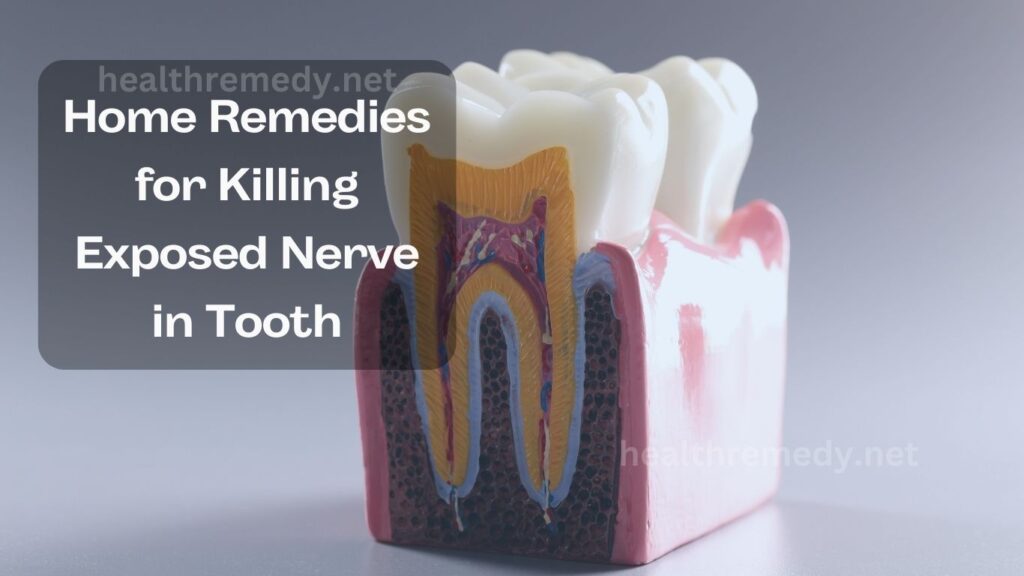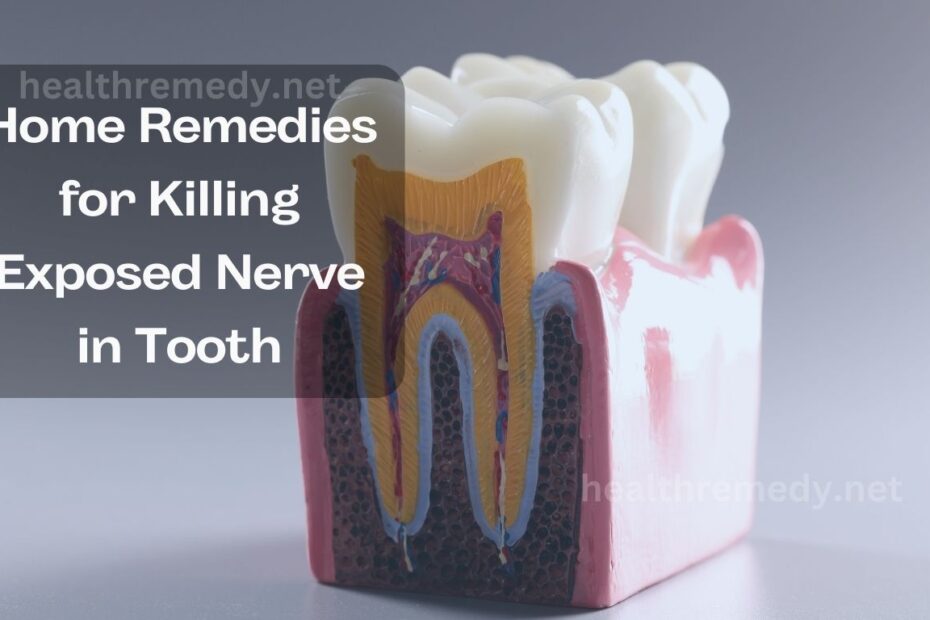Explore effective home remedies for killing exposed nerve in tooth, understand why it happens, and learn preventive measures for maintaining dental health.
Home Remedies for Killing Exposed Nerve in Tooth
An exposed nerve in the tooth can cause intense pain and discomfort. While professional dental help is often necessary, there are several home remedies that can alleviate the pain and possibly kill the nerve. However, these remedies are not replacements for professional medical advice.

Understanding the Anatomy of a Tooth
To comprehend the effect of an exposed nerve, it’s crucial to understand the basic anatomy of a tooth. A tooth consists of three layers – enamel, dentin, and pulp. The pulp, residing in the center, houses the nerve and blood vessels. When the enamel and dentin erode due to factors like decay or trauma, the nerve becomes exposed and causes pain.
Why does a Tooth Nerve get Exposed?
Several reasons can lead to a tooth nerve getting exposed. Common causes include cavities, cracks or fractures in the teeth, gum disease, and tooth erosion due to acidic food or drink.
Recognizing the Symptoms of an Exposed Tooth Nerve
An exposed tooth nerve can cause significant discomfort. Knowing the symptoms can help you seek appropriate treatment and implement home remedies more effectively.
Typical Signs and Symptoms
Signs of an exposed nerve include sharp, severe pain when the tooth is exposed to hot or cold temperatures or sweet foods and drinks, pain when biting down, and in some cases, a visible hole or pit in the tooth. Other symptoms may include swelling or tenderness in the gum around the tooth.
The Impact on Daily Life
The symptoms associated with an exposed nerve can severely impact daily life. They may cause difficulty in eating and drinking, interrupt sleep, and lead to overall discomfort throughout the day. These symptoms emphasize the importance of addressing the issue promptly with professional help and through home remedies.
When to Seek Professional Dental Help
While home remedies can help alleviate the pain associated with an exposed tooth nerve, they are not a definitive solution. It’s essential to know when to seek professional help to prevent further complications.
Red Flags to Watch Out for
Certain signs indicate the need for immediate professional intervention, including persistent severe pain, swelling in the gums or face, fever, or a bad taste in the mouth that doesn’t go away. These could suggest an infection that needs prompt attention.
The Role of Dentists in Dental Nerve Health
Dentists play a crucial role in maintaining dental nerve health. They can accurately diagnose the cause of the pain, provide professional treatment, and offer advice on effective home remedies and preventive measures.
Understanding the Risks of Neglecting an Exposed Tooth Nerve
Ignoring the symptoms of an exposed tooth nerve can lead to more serious dental problems. It’s essential to understand the potential risks associated with neglecting an exposed nerve.

Potential Complications
If an exposed tooth nerve is left untreated, it can lead to complications such as an abscess (a pus-filled pocket), spread of infection, loss of the tooth, and in severe cases, sepsis—a life-threatening infection that spreads throughout the body.
Long-term Dental Health Implications
Neglecting an exposed tooth nerve can have serious long-term implications for dental health, including chronic pain, difficulty in chewing, shifting of teeth, and impact on overall oral health. Regular dental visits and timely treatment are crucial in preventing these problems.
Common Dental Procedures for an Exposed Nerve
Professional dental treatments are often necessary to fully resolve the issue of an exposed nerve. Here’s a look at some common procedures performed by dentists in these cases.
Root Canal Therapy
A root canal is a common procedure performed to treat an exposed tooth nerve. The dentist removes the exposed nerve and pulp, cleans and shapes the inside of the root canal, then fills and seals the space. A crown is often placed afterward to protect the tooth.
Dental Crowns
Dental crowns, also known as caps, cover the entire tooth surface, restoring it to its original shape and size. Crowns protect and strengthen tooth structure that cannot be restored with fillings or other types of restorations. They are often used after a root canal treatment.
Extraction and Dental Implants
In some cases, if the tooth cannot be saved, extraction may be necessary. Following extraction, dental implants can replace the lost tooth, preventing other teeth from shifting and maintaining the functionality of teeth.
Natural Remedies for Pain Relief
While not curative, certain natural remedies can offer temporary relief from the pain caused by an exposed tooth nerve.
Clove Oil
Clove oil is widely recognized for its analgesic, anti-inflammatory, and antibacterial properties. Applying a small amount of clove oil to the affected area can help numb the pain. However, it’s essential to use it sparingly to avoid potential irritation.
Salt Water Rinse
A salt water rinse can also help by drawing out some of the fluid causing inflammation and promoting healing. Additionally, it can wash away any debris in the mouth and help fight bacteria that could potentially lead to infection.
Cold Compress
Applying a cold compress to the affected area can help reduce inflammation and numb the area, providing temporary relief from the pain.
Proven Home Remedies for an Exposed Tooth Nerve
In addition to natural pain relief methods, some home remedies have been found effective in treating an exposed tooth nerve. Here are a few popular options.
Garlic
Garlic has been widely used as a home remedy due to its natural antibacterial properties. Crushing a garlic clove and applying it to the affected area may help alleviate pain and prevent bacterial infection.
Onion
Onion contains phytochemicals that target the germs responsible for the infection, helping to provide relief. Placing a piece of fresh onion on the affected tooth can assist in managing the discomfort.
Guava Leaves
Guava leaves have anti-inflammatory, analgesic, and antimicrobial properties. Chewing on clean, fresh guava leaves or using a mouth rinse made from boiled guava leaves can be beneficial.
Over the Counter Options for Pain Management
While home remedies can provide relief, over-the-counter (OTC) medications are also available for managing pain related to an exposed tooth nerve.
Topical Oral Analgesics
Topical oral analgesics like benzocaine can be applied directly to the affected tooth and gum to numb the area, offering temporary relief from the pain.
Oral Pain Relievers
Non-prescription oral pain relievers, such as ibuprofen or acetaminophen, can also help manage the pain. However, they should be used according to the instructions and never exceed the recommended dose.
The Role of Diet in Dental Nerve Health
A balanced diet plays an essential role in maintaining overall dental health and can help manage the symptoms of an exposed tooth nerve.
Foods to Avoid
Certain foods and drinks can aggravate the pain of an exposed nerve. These include sugary foods, acidic foods and drinks, hard or crunchy foods, and extremely hot or cold foods and drinks.
Foods to Include
On the other hand, eating a balanced diet that includes vitamins A, C, and D, and calcium can help strengthen the teeth. Soft foods may also be more comfortable to eat if you have an exposed nerve.
Preventing Tooth Nerve Exposure
Preventing a tooth nerve from becoming exposed in the first place is key to avoiding the associated pain and discomfort. Here are a few ways to prevent tooth nerve exposure.
Regular Dental Check-ups
Regular dental check-ups can help detect potential issues early, before they progress to the point of nerve exposure. Dentists can spot signs of tooth decay, cracks, or other issues that could lead to a nerve becoming exposed.
Proper Oral Hygiene
Maintaining proper oral hygiene is crucial for preventing nerve exposure. This includes brushing twice a day with fluoride toothpaste, flossing daily, and using an antibacterial mouthwash to kill bacteria that can lead to tooth decay and gum disease.
Myths and Misconceptions About Home Remedies
While home remedies can play a role in managing an exposed tooth nerve, it’s essential to separate fact from fiction to avoid causing more harm than good.
Common Misconceptions
One common misconception is that home remedies can replace professional dental treatment. While they can offer temporary relief, they are not a definitive cure. Also, the notion that all-natural remedies are safe is a misconception. Some natural remedies can cause side effects or interact negatively with other medications or conditions.
Scientific Facts
Science-backed home remedies are typically safer and more effective. For example, clove oil, garlic, and saltwater rinses have been shown to have anti-inflammatory and analgesic properties. However, these should be used as part of a comprehensive treatment plan that includes professional dental care.
The Effectiveness and Limitations of Home Remedies
Home remedies can be effective in providing temporary relief from the pain of an exposed tooth nerve, but they do have their limitations.
When Do Home Remedies Work?
Home remedies tend to be most effective for temporary relief of mild to moderate pain and inflammation. They can also help manage symptoms while you’re waiting to see a dentist or between dental treatments.
The Importance of Professional Medical Advice
While home remedies can provide some relief, they cannot substitute professional medical advice. An exposed nerve is often a sign of a more serious underlying dental issue that requires professional treatment. Always consult a dentist before starting any home remedy regimen.
Safety Measures When Using Home Remedies
While home remedies can be a useful tool in managing dental pain, it’s crucial to use them safely to avoid any adverse effects.
Possible Side Effects
Some home remedies can have side effects. For instance, clove oil, while effective, can cause a burning sensation if used excessively. Similarly, excessive use of saltwater can lead to an imbalance of electrolytes in the body. Always use home remedies as directed and in moderation.
Safe Usage Guidelines
Ensure the remedies are used correctly. For instance, apply topical treatments only to the affected area, and avoid swallowing them. If any remedy causes increased pain, discomfort, or other side effects, discontinue its use immediately and consult a healthcare professional.
Caring for Your Teeth Post Treatment
After treating an exposed tooth nerve, it’s essential to continue caring for your teeth to prevent future issues.
Post Home Remedy Care
Even after the pain subsides, continue practicing good oral hygiene. This includes regular brushing, flossing, and rinsing with an antibacterial mouthwash. Avoid eating hard, crunchy, or overly sugary foods that can damage the teeth.
Continuing Dental Check-ups
Continue with regular dental check-ups and cleanings even after your tooth nerve has been treated. Regular check-ups allow your dentist to monitor your oral health and catch any potential issues early.
Best Practices for Maintaining Healthy Teeth
Beyond dealing with immediate dental issues like exposed nerves, adopting best practices for maintaining overall dental health is essential.
Proper Brushing Techniques
Proper brushing involves not just the frequency but also the technique. Brush at least twice a day, using a soft-bristled brush and fluoride toothpaste. Make sure to brush all surfaces of your teeth, and replace your toothbrush every 3-4 months.
Importance of Flossing and Mouthwash
Flossing daily helps to remove food particles and plaque from between the teeth and along the gum line that a toothbrush can’t reach. Using an antibacterial mouthwash can help kill bacteria that cause tooth decay and gum disease.
Understanding the Connection Between Overall Health and Dental Health
Your dental health is closely linked with your overall health, making it even more critical to maintain good oral hygiene.
Impact of Oral Health on Overall Health
Poor oral health can lead to problems beyond the mouth, including heart disease, diabetes, and pregnancy complications. Therefore, maintaining good oral health contributes to overall well-being.
Importance of a Healthy Diet and Lifestyle
A healthy diet and lifestyle not only contribute to overall health but also support dental health. Avoiding excess sugar, tobacco products, and excessive alcohol, and maintaining a balanced diet can all contribute to healthier teeth and gums.
